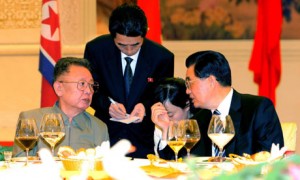PART II
North Korea will never honestly negotiate a dismantling of its nuclear weapons; this is the only trump card that has ensured cash flow into the regime. In essence, N. Korea is black mailing the region (and the U.S.). This behavior is not surprising, as the North is a “mafia state” lead by the Kim family, whose power is is dependent on a wide reaching patronage network that extends into the Worker’s Party and the military. When the liquidity of this system dries up, Kim family rule ends. China is acutely aware of this, which is why they will continue to support the North in the near term, unless the equation is changed.

Don Kim and his Benefactor Hu Jintao
Still, de facto regional acceptance of a nuclear-armed North would likely lead Japan to re-militarize and potentially nuclearize, which in-turn would destabilize the regional. It would also be a deathblow to the Non-Proliferation Treaty, as many states will be encouraged to develop their own nuclear capabilities. If the United States and its allies ever wish to accomplish their goals, they must change the dynamic. Kim Jong-il has to be convinced that any action other than the cessation of all missile testing and nuclear material production will result in a war he can not win, regime change, and him on trial at the Hague and/or dead.
Undoubtedly, such bold action will result in the immediate escalation of tensions, but it will also force China to recalculate the usefulness of buttressing North Korea. If China wants stability on its border, a costly war possibly involving U.S., South Korean, and even Japanese soldiers at the Yalu River border would not be beneficial to its economic growth and domestic stability.
Still, before China would stop aiding North Korea, because there is a possibility of state collapse before Kim Jong-il submits to external pressure, the U.S. and Japan must guarantee China (and South Korea) that they will deal with the resulting refugee situation. The U.S. must also promise China not to move U.S. troops above the 38th parallel (Korean Demilitarized Zone), even if Korea is unified. There will likely be other diplomatic concessions necessary, but the key is not to sweeten the deal for China, but to force China to take a deal, then minimize the damage after the fact, to allow the Chinese government to maintain some face before it’s public, which is critical for Beijing’s legitimacy at home.
Calling Mr. Kim’s bluff and pressuring China is a risky proposition. North Korea could decimate Seoul and the estimated 1.2 million troops on the border will likely overrun U.S. and South Korean resistance. Japan is also a likely target of North Korean missile attacks. The orders to do this might not even come from Kim Jong-il, but a rogue military leader inside the regime. These are potential threats, but the reality is that in the last 15 years North Korea has increased its military capability, and there is no reason to believe that trend will not continue. History instructs that it is better to take decisive action sooner rather than later. If Mr. Kim is truly a rational actor he will take a “way out”, such as a guaranteed safe haven and immunity from international human rights prosecution, both of which are preferable to death or being an international fugitive. If such a deal was offered without intense pressure, Kim will not only balk, but due to the regimes paranoia, believe it was a trap.
China may initially attempt to test the U.S. resolve by “acting out” in regard to the Iranian nuclear issue. Beijing may also resort to a limited form of passive-aggressive economic warfare, as they recently have done with Japan over the Senkaku Islands. But the truth is, Beijing needs the U.S. market, it also needs to control inflation at home by using the US dollar to manipulate its currency, in these things the U.S. has an advantage. What they will not do is attempt a military standoff, as their military is not capable of preventing allied naval blockades of the North. There will still be Chinese goods going across the border, but it is doubtful China will be willing or able to make up the difference in income North Korea receives from international counterfeiting, weapons sells, and drug smuggling.
In order to force Kim to the bargaining table, the U.S. and its allies must do the following: First, improve and expand the missile defense shield and inform Pyongyang that any further missiles launched outside North Korean airspace will be shot down, as they are a violation of international law. Secondly, any ships leaving or entering North Korean waters will be searched for contraband according to UN resolution 1718. Ships refusing to submit to searches will be sunk. Thirdly, the South Korean Sunshine Policy is officially over. There will be no further economic interaction until North Korea unconditionally returns to 6-Party Talks. Fourthly, there will be a new joint commission established to investigate the Japanese abduction issues. Fifthly, there will be no new bilateral talks with the U.S., Japan, or South Korea. Lastly, North Korea can only return to 6-Party Talks after it has shut down its nuclear power plant and allowed unfettered access to UN weapons inspectors.
Unfortunately I do not believe the Obama Administration or its allies in the region have the will to take such bold steps, something North Korea and China are well aware of, so this issue will drag on, at least until the time Kim Jong-il’s successor takes charge, which could be as long as a decade.